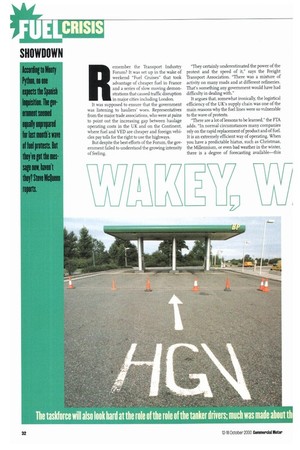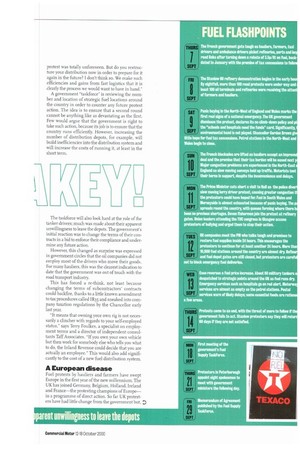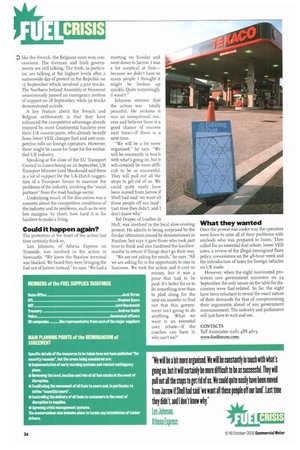R ernember the Transport Industry Forum? It was set up in
Page 34

Page 35

Page 36

If you've noticed an error in this article please click here to report it so we can fix it.
the wake of weekend "Fuel Cruises" that took advantage of cheaper fuel in France and a series of slow moving demonstrations that caused traffic disruption in major cities including London. It was supposed to ensure that the government was listening to hauliers' woes. Representatives from the major trade associations, who were at pains to point out the increasing gap between haulage operating costs in the UK and on the Continent, where fuel and VED are cheaper and foreign vehicles pay tolls for the right to use the highways.
But despite the best efforts of the Forum, the government failed to understand the growing intensity of feeling. "They certainly underestimated the power of the protest and the speed of it," says the Freight Transport Association. "There was a mixture of activity on many roads and at different refineries. That's something any government would have had difficulty in dealing with."
It argues that, somewhat ironically, the logistical efficiency of the UK's supply chain was one of the main reasons why the fuel lines were so vulnerable to the wave of protests.
"There are a lot of lessons to be learned," the ETA adds. "In normal circumstances many companies rely on the rapid replacement of product and of fiiel. It is an extremely efficient way of operating. When you have a predictable hiatus, such as Christmas, the Millennium, or even bad weather in the winter, there is a degree of forecasting available—this protest was totally unforeseen. But do you restructure your distribution now in order to prepare for it again in the future? I don't think so. We make such efficiencies and gains from fast logistics that it is clearly the process we would want to have in hand."
A government "taskforce" is reviewing the number and location of strategic fuel locations around the country in order to counter any future protest action. The idea is to ensure that a second round cannot be anything like as devastating as the first. Few would argue that the government is right to take such action, because its job is to ensure that the country runs efficiently. However, increasing the number of distribution depots, For example, will build inefficiencies into the distribution system and will increase the costs of running it, at least in the short term.
The taskforce will also look hard at the role of the tanker drivers; much was made about their apparent unwillingness to leave the depots. The government's initial reaction was to change the terms of their contracts in a bid to enforce their compliance and undermine any future action.
However, this changed as surprise was expressed in government circles that the oil companies did not employ most of the drivers who move their goods. For many hauliers, this was the clearest indication to date that the government was out of touch with the road transport industry.
This has forced a re-think, not least because changing the terms of subcontractors' contracts could backfire, thanks to a little known amendment to tax procedures called IR35 and sneaked into company taxation regulations by the Chancellor early last year.
"It means that owning your own rig is not necessarily a clincher with regards to your self-employed status," says Terry Foulkes, a specialist on employment terms and a director of independent consultants Taff Associates. "If you own your own vehicle but then work for somebody else who tells you what to do, the Inland Revenue could decide that you are actually an employee." This would also add significantly to the cost oF a new fuel distribution system.
A European disease
Fuel protests by hauliers and farmers have swept Europe in the first year of the new millennium. The UK has joined Germany, Belgium, Holland, Ireland and France—the protesting champions of Europe— in a programme of direct action. So far UK protesters have had little change from the government but, D
P like the French, the Belgians soon won concessions. The German and Irish governments are still talking. The Irish, in particular, are talking at the highest levels after a nationwide day of protest in the Republic on 15 September which involved 2,500 trucks. The Northern Ireland Assembly at Stormont unanimously passed an emergency motion of support on 18 September, while 50 trucks demonstrated outside.
A key feature about the French and Belgian settlements is that they have enhanced the competitive advantage already enjoyed by most Continental hauliers over their UK counterparts, who already benefit from lower VED, cheaper fuel and anti-competitive tolls on foreign operators. However, there might be cause for hope for the embattled UK industry.
Speaking at the dose of the EU Transport Council in Luxembourg on 20 September, UK Transport Minister Lord Macdonald said there is a lot of support for the UK-Dutch suggestion of a European forum to examine the problems of the industry involving the "social partners" from the road haulage sector.
Underlying much of the discussion was a concern about the competitive conditions of the industry and its problems, such as its very low margins. In short, how hard it is for hauliers to make a living.
Could It happen again?
The protesters at the heart of the action last time certainly think so.
Len Johnson, of Athena Express on Tyneside, was involved in the action in Newcastle. "We knew the Stanlow terminal was blocked. We heard they were bringing the fuel out of Jarrow instead," he says. "We had a meeting on Sunday and went down to Jarrow. I was a bit sceptical at first— because we didn't have so many people I thought it might be broken up quickly. Quite surprisingly, it wasn't."
Johnson stresses that the action was totally peaceful. He reckons it was an unequivocal success and believes there is a good chance of success next time—if there is a next time.
"We will be a bit more organised," he says. "We will be constantly in touch with what's going on, but it will certainly be more difficult to be as successful. They will pull out all the stops to get rid of us. We could quite easily have been moved from Jarrow if Shell had said 'we want all these people off our land'. Last time they didn't, and I don't know why."
Sid Draper, of Loadtec in Hull, was involved in the local slow-moving protest. He admits to being surprised by the Go-day ultimatum issued by demonstrators in Stanlow, but says it gave those who took part time to think and also hardened the hauliers' resolve to return if things don't go their way.
"We are not asking for much," he says. "All we are asking for is the opportunity to stay in business. We took the action and it cost us money, but it was a price that had to be paid. It's better for us to do something now than to plod along for the next six months to find out that this government isn't going to do anything. What we want is an essential user rebate—if the coaches can have it, why can't we?"
What they wanted
Once the protest was under way, the operators were keen to raise all of their problems with anybody who was prepared to listen. They called for an essential fuel rebate, lower VED rates, a review of the illegal immigrant fines policy, concessions on the 48-hour week and the introduction of taxes for foreign vehides on UK roads.
However, when the eight nominated protesters met government ministers on 22 September, the only issues on the table for discussion were fuel-related. So far, the eight have been reluctant to reveal the exact nature of their demands for fear of compromising their arguments ahead of any government announcement. The industry and parliament will just have to wait and see.
CONTACTS
Taff Associates: o261488 4613, www.fuelforum.com.












































































































